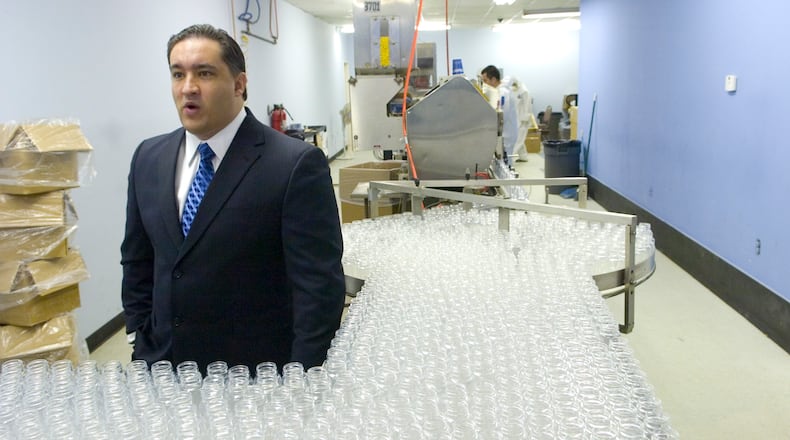It has been a difficult month for Jared Wheat, the Atlanta-area dietary supplement entrepreneur. And that’s putting it mildly.
Less than a week after federal authorities unsealed an indictment accusing the Hi-Tech Pharmaceuticals CEO of wire fraud, money laundering and other charges, a federal judge has ordered him, his company and an associate to pay more than $40 million to resolve an unrelated civil matter.
The Tuesday ruling by U.S. District Judge Charles A. Pannell Jr. didn't arrive out of the blue. It's the latest chapter in the Federal Trade Commission's long-running lawsuit challenging Hi-Tech's advertising. Still, Pannell's 132-paging missive is yet another body blow for Wheat and his Norcross-based firm, detailing what, in the judge's view, was an attempt to justify product claims with questionable science.
Credit: Lois Norder
Credit: Lois Norder
Pannell affirmed the FTC’s contention that Wheat, Hi-Tech and a company vice president, Stephen Smith, violated permanent injunctions barring them from making unsubstantiated claims about four weight-loss supplements: Fastin, Lipodrene, Benzedrine and Stimerex-ES. The group must pay $40.1 million, the amount it received in gross receipts for the products during a 4½-year period, and the FTC must distribute the money to consumers, the judge ruled.
The FTC had asked Pannell to impose a separate sanction of $34.4 million to compensate consumers, but the judge declined.
The ruling also requires an Atlanta weight-loss physician, Dr. Terrill Mark Wright, to pay $120,000 for making unsubstantiated statements about Fastin.
"The court recognizes that the compensatory sanctions were significant, but so, too, was the defendants' contumacious conduct," Pannell wrote.
The sanctions stem from a lawsuit filed by the FTC 13 years ago that has had a number of twists and turns, including a hearing in which Wheat invoked his Fifth Amendment right against self-incrimination 19 times and later collapsed in a men’s room outside the courtroom.
In 2014, Pannell ruled that the defendants were liable for $40 million in compensatory sanctions. However, the 11th Circuit Court of Appeals vacated the order. It said the lower court had improperly applied the doctrine of collateral estoppel, which prevents certain issues from being relitigated.
Pannell’s ruling Tuesday in essence reinstates the earlier order while also poking holes in Hi-Tech’s reasoning for why its advertising claims can stand up to scrutiny.
In one particularly telling passage, Pannell notes that one of the experts who testified on Hi-Tech’s behalf, Timothy Gaginella, received $60,000 a year from Wheat or his companies. The judge goes on to state that Wheat or his companies twice forged Gaginella’s signature to show that he endorsed a Hi-Tech product.
“While the evidence is more reflective of Wheat’s guile, the court mentions it here because the history between Hi-Tech and Dr. Gaginella is dubious,” Pannell wrote.
In the indictment unsealed on Oct. 5, the government contends that Wheat created a series of fake documents to make it appear to customers that Hi-Tech products met various standards set by the U.S. Food and Drug Administration. The indictment also asserts that Wheat and Hi-Tech manufactured and distributed prohormone supplements that contained anabolic steroids and a supplement for reducing cholesterol that contained the prescription drug Lovastatin.
About the Author





